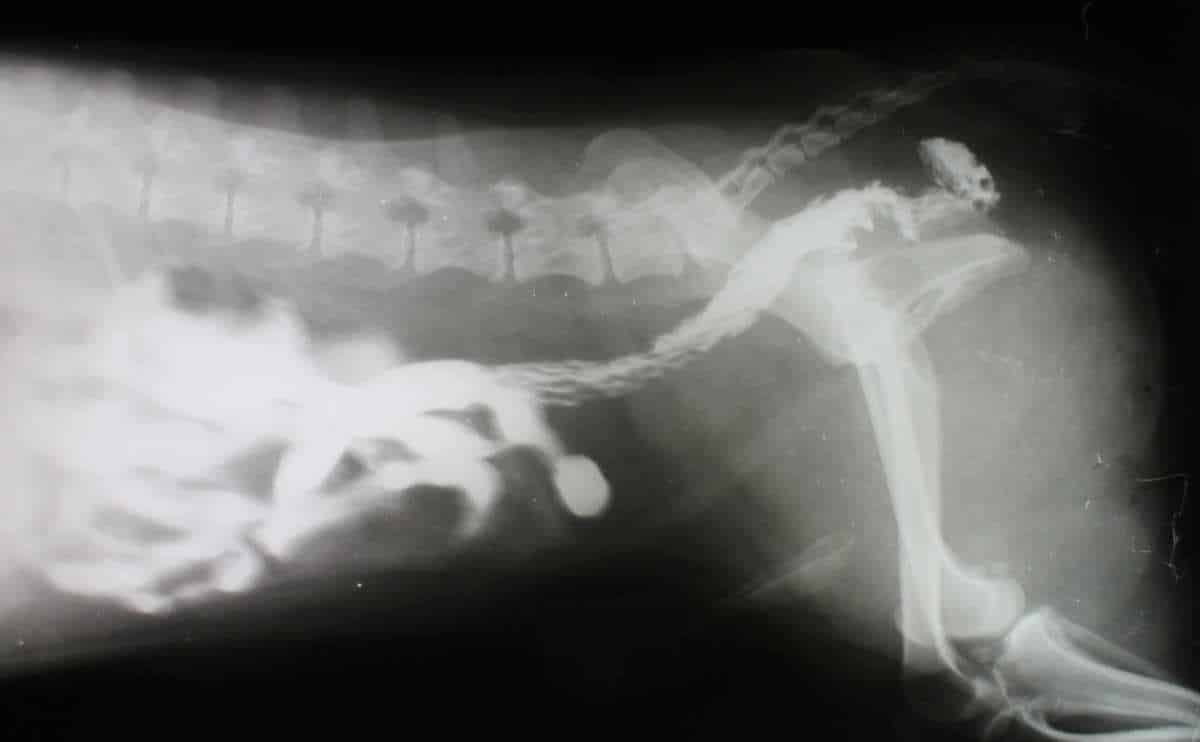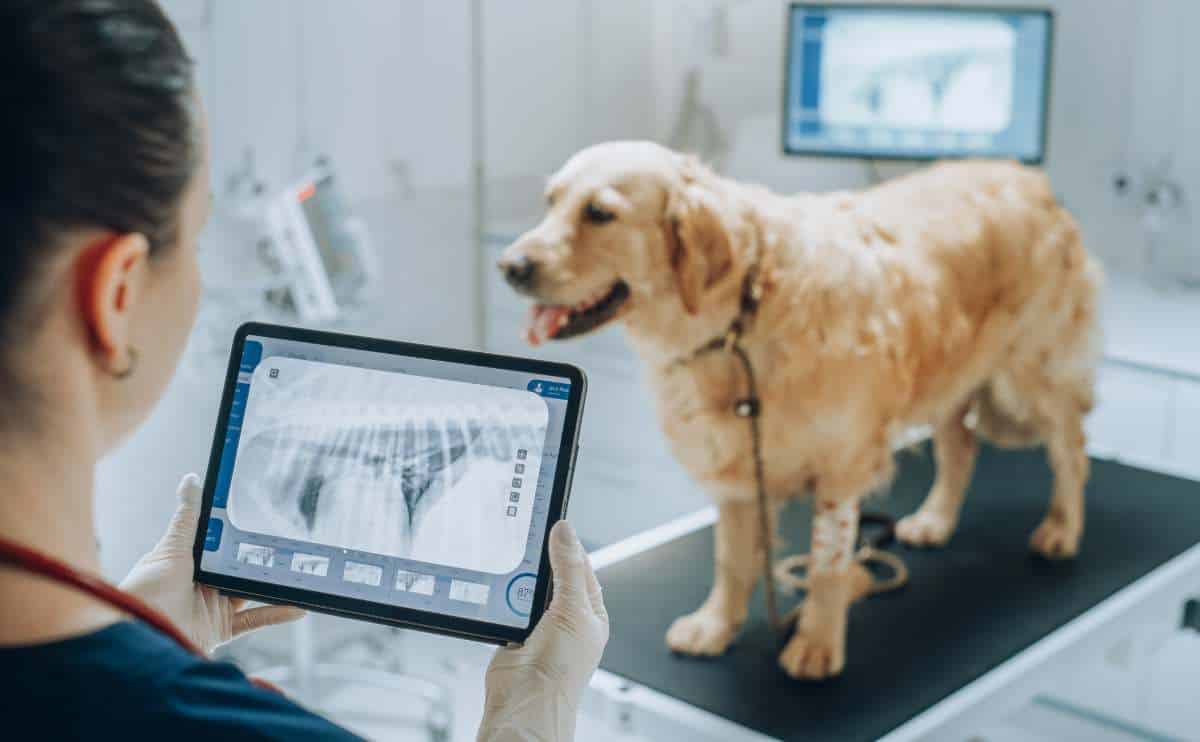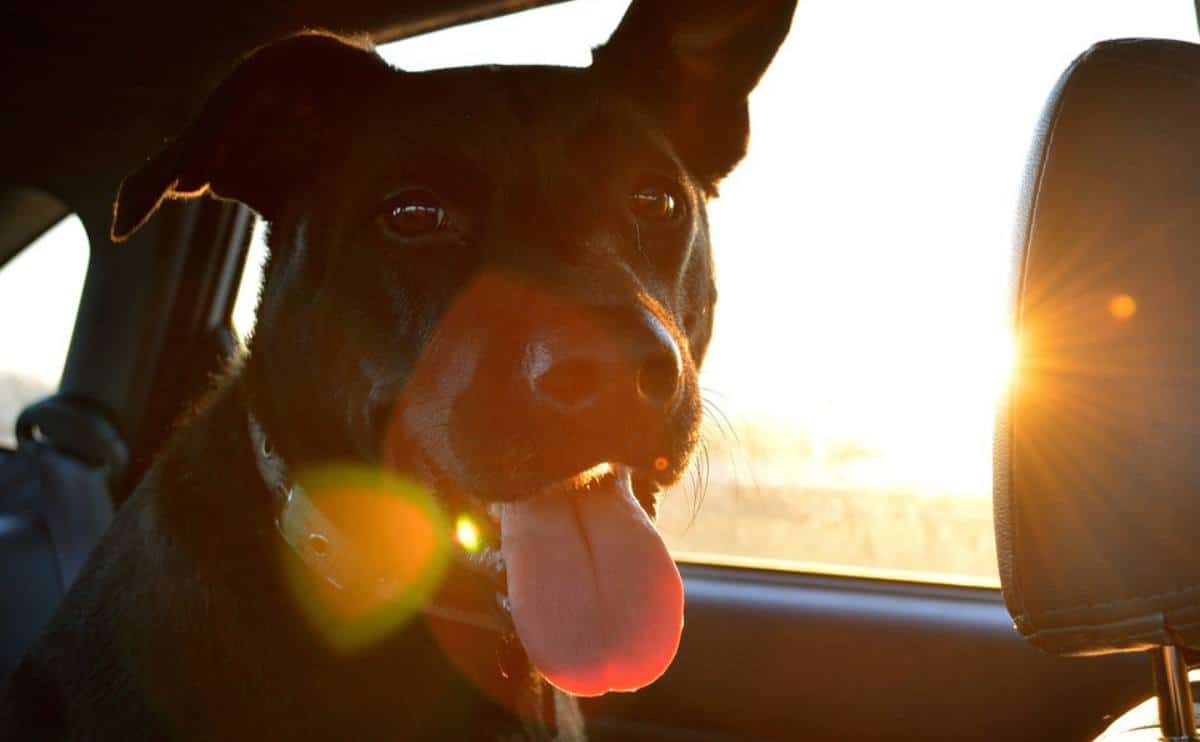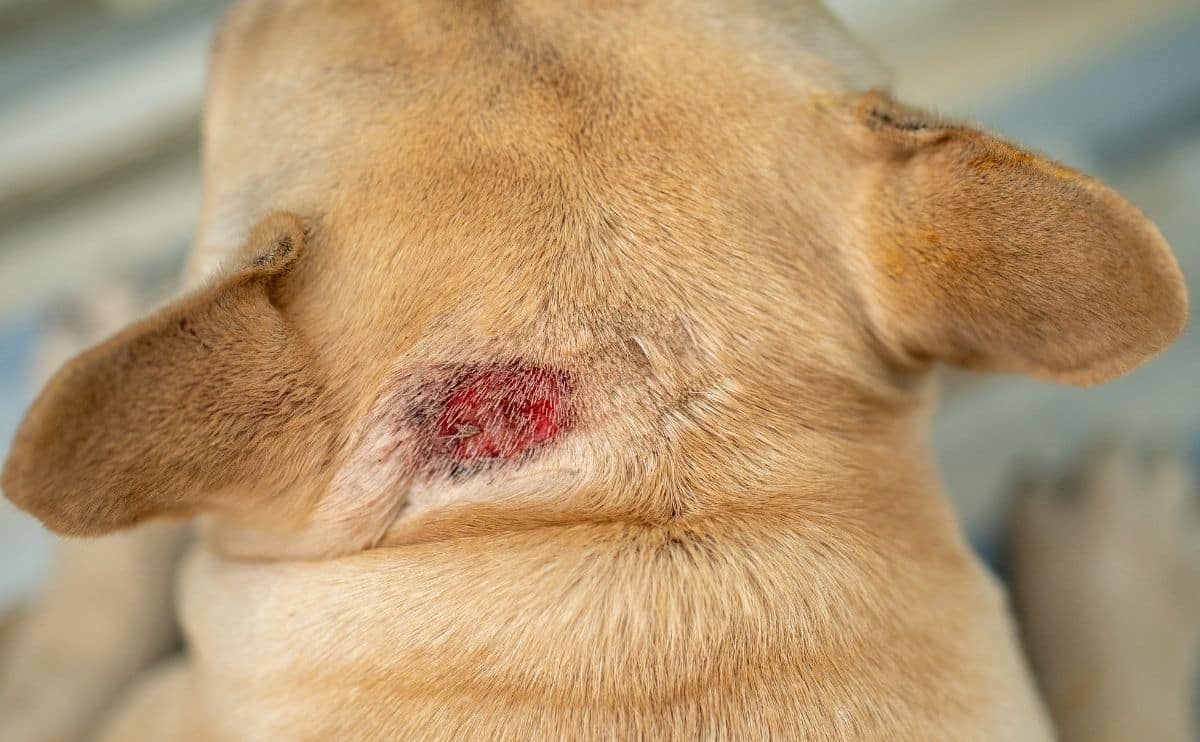Dog Intestinal Blockage: Timeline, Signs, Symptoms, Cost, Surgery, Recovery, Success Rates, & More
When you purchase through links on our site, we may earn a commission. Here’s how it works.

Is your pup a big-time chewer? If so, there’s a chance your dog may experience intestinal blockage at some point in their lifetime. All it takes is your dog ingesting one small toy or sock to cause a serious blockage in his gastrointestinal (GI) tract, which can lead to major surgery and astronomical medical bills.
Table of Contents
What Causes Intestinal Blockage In Dogs?
Gastrointestinal (GI) obstructions, also called bowel obstructions, are common in dogs because they love to chew on foreign objects and inevitably end up swallowing something they shouldn’t. Puppies (aka chewing machines) are particularly prone to this condition. But adult dogs are still at a high risk. When dogs get into your garbage, they can ingest bones and other foreign objects that are dangerous.
A blockage can occur anywhere in the digestive tract, including the esophagus, stomach, small intestine, or rarely the large intestine. Although not as common, other GI blockage causes include tumors, GI inflammation, intestinal parasites, or twisting of the intestines.
What Are The Symptoms?

How do you know if your dog has an intestinal blockage? Dog intestinal blockage symptoms could be easy to brush off as merely an upset stomach unless you witnessed your dog swallow a foreign object.
If you think your dog ingested something suspicious or they are exhibiting the symptoms listed below, call your veterinarian as soon as possible.
- Vomiting
- Loss of appetite
- Weakness
- Nausea
- Diarrhea
- Straining or unable to poop
- Painful abdomen to the touch
- Whining
- Bloating
- Dehydration
- Restlessness
- Aggressive behavior when the abdomen is touched
Left untreated, a blockage in your pup’s bowels can cause serious and life-threatening problems, including severe dehydration, decreased blood flow to the intestines, and even enough damage to the intestines that causes the tissue to die, resulting in bowel rupture.
Diagnosis & Treatment

If you saw your dog eat a foreign object, you might be wondering how you can help your dog pass that obstruction. The short answer is you can’t. Take your dog to your vet. If you notice any of the symptoms above, it’s important to visit your veterinarian immediately.
Your vet will first perform a physical exam to get an overall look at your dog, paying special attention to the abdomen. They may also perform blood work to determine if the blockage is affecting your dog’s overall health.
From there, your vet will perform some imaging tests to try to see the foreign object. One such test is an endoscopy, a procedure that inserts an endoscope (a small tube with a tiny attached camera) through your dog’s throat and into your pup’s gastrointestinal tract. Your dog would be sedated for this procedure.
In some cases, a vet can retrieve the foreign object during the endoscopy. If not, your vet likely will perform an ultrasound or take X-rays to determine where (and what) the obstruction is in the digestive tract.
If your dog is dehydrated, your vet will give them IV fluids. Beyond rehydrating, fluids can also encourage the GI tract to push the blockage down through the intestines and out of your dog’s body.
Some foreign objects, given time, can pass on their own. However, when it comes to a timeline for intestinal blockage in dogs, time is absolutely of the essence. If the object does not pass on its own and your dog has the symptoms listed above, your dog will need to be treated as soon as possible.
If your vet determines that the foreign object presents an immediate danger, emergency surgery is ordered.
What To Expect From Surgery

Dog intestinal blockage surgery is a major procedure, requiring your dog to be anesthetized. After the surgery, your dog will stay at the hospital and recover for several days.
For the intestinal surgery, your vet will make an incision into your dog’s abdomen near the blockage site and carefully extract the object. Additionally, they may need to repair any damage to the stomach or intestinal wall resulting from the obstruction.
Your dog’s survival after surgery to remove an intestinal blockage depends on a few things:
- Size, shape, and location of the foreign object
- How long the foreign object has been stuck in the intestines
- Your dog’s health before the surgery
- Post-surgery infections and even sepsis (on rare occasions)
The physical exam and diagnostic tests that your vet performs before surgery will help them determine how well they think your dog will do after surgery. Of course, the sooner the surgery is performed, the better.
The following video gives you comprehensive information on what to expect from treatment and surgery. Use viewer discretion, as some images are graphic.
Recovery

After surgery and hospitalization, monitor your dog and keep their activity level very low. Stick to short walks for at least a week — you don’t want their sutures to tear. Your dog will also need to wear the dreaded cone to prevent chewing on the healing incision.
It’s important to feed your dog small amounts of bland food before gradually transitioning to his previous diet during this time. Also, make sure they are getting enough fluids to prevent dehydration.
Major surgery is painful. Your dog won’t be in pain during the surgery, of course, but will probably feel some pain afterward. Your vet will prescribe post-surgery pain medication for your dog. Follow the prescription instructions carefully to keep your dog’s pain under control at home.
Anesthesia can make some dogs feel nauseated after surgery and it’s common for dogs to vomit afterwards. So, your vet may also prescribe medications to relieve your dog’s nausea and vomiting, if needed.
How Much Does Dog Intestinal Blockage Surgery Cost?
Dog intestinal blockage surgery costs range anywhere from $800 to $7,000. The price depends on how extensive the damage is, the length of the hospital stay, the types of medications required, and other factors (like where you live).
How Can You Reduce The Cost?
Getting pet health insurance when your dog is young is the best way to plan for unexpected health problems throughout their life. Signing your dog up as young as possible can help minimize your premium and reduce the potential for any pre-existing condition exclusions. Fill out the short form below to get a pet insurance quote for your dog.
Sample Reimbursement Claim From Pet Insurance
Check out this reimbursement from one of the best pet insurance companies, Healthy Paws.

Pet: Jude, 18-month-old Lab
Diagnosis & Treatment: Major Tummy Surgery/Foreign Body Obstruction Surgery
Total Vet Cost: $4,734
Healthy Paws Pet Insurance Reimbursement: $4,201
Out-of-Pocket Expense: $533
Frequently Asked Questions
Here are some of the questions pup parents ask most often about GI obstructions. Don’t see yours here? Ask us in our comments.
How Do You Know If Your Dog Has A Blockage?
In many cases, it can be hard to distinguish between a bowel blockage and general gastrointestinal tract problems. Some more obvious signs of a blockage include whining, clear abdominal pain, aggressive behavior when the abdomen is touched, bloating, straining or unable to poop, and restlessness.
Will A Dog Still Poop If They Have A Blockage?
In some cases, your pup may be able to pass a small amount of poop or liquid stool. However, your dog will likely strain to do so. In the case of a complete blockage, your pup may not be able to pass stool at all.
How Long Can A Dog Survive With A Blockage?
Without treatment, dogs with a complete bowel obstruction typically die within three to seven days. While some smaller foreign objects can pass on their own after time, it’s crucial to contact your vet if you notice warning signs. You have no way of knowing how serious the blockage is, so don’t wait it out.
Can Dog Treats Cause Intestinal Blockage?
Yes, in some cases. That’s why the ASPCA encourages owners to keep a close eye on their dogs with dental and durable chews, like rawhide bones. Aggressive chewers may swallow harder substances without chewing them thoroughly. Also, if you give your pup fruits as a treat, be sure to remove pits, peels, seeds, and rinds, as they can also pose a risk for intestinal blockage.
Should You Get Pet Insurance?
If you’ve never had pet insurance before, there’s a lot to learn. But never fear, our experts are here with an easy-to-understand pet insurance 101 guide. It includes everything from insurance terminology and how it works to price estimates and company recommendations.
Then, when you’re ready, learn about the best pet insurance companies. We’ve chosen the top insurers based on specific needs, including age, cost, features, and more.
Why Trust Canine Journal?
Sally has over 20 years of experience in human health sciences communications, including 10 years as an expert on pet health conditions and treatment. She’s also spent over a decade researching pet insurance as part of an expert team at Canine Journal. As dedicated canine professionals and long-time dog owners, we test and research the best pet products, not only for our own pups but for all of our readers.


